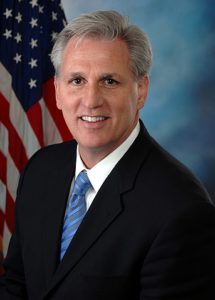
House Republicans elected Representative Kevin McCarthy of California to serve as Minority Leader for the 116th Congress on Wednesday. He defeated Representative Jim Jordan of Ohio, who had the support of the party’s more conservative wing. McCarthy won 159-43.
Most of the elected leaders serving under McCarthy ran unopposed. The Minority Whip will be Representative Steve Scalise of Louisiana. Representative Liz Cheney of Wyoming will serve as Chair of the House Republican Conference. (Her father, Vice President Dick Cheney, served as Conference Chair in the 1980s.) Representative Mark Walker of North Carolina was elected Vice Chair of the Republican Conference. Representative Jason Smith of Missouri will be the Conference Secretary. Representative Tom Emmer of Minnesota was elected National Republican Campaign Committee Chairman. Representative Gary Palmer of Alabama will be the Policy Committee Chairman; he beat Representative Dave Schweikert of Arizona.
These Members of the House will coordinate various activities on behalf of their colleagues. McCarthy will serve as the chief spokesman for House Republicans and coordinate Floor activities. Working closely with him will be Scalise, who, as Whip, is primarily responsible for gauging how his colleagues will vote on legislation and coaxing them to vote for the party’s official policies. The Republican Conference is the party’s organizing body and coordinates various administrative and communications activities. As the name suggests, the Republican Policy Committee is a forum in which party members can discuss policy ideas and the merits of legislation. The Chair of the National Republican Congressional Committee (NRCC) oversees efforts to elect party members to Congress. (The NRCC and its Democratic counterpart, the Democratic Congressional Campaign Committee, do not receive government funds or other resources, like office space.)
McCarthy has served as the House Majority Leader since August 2014. Although he will hold the post of “Minority Leader,” please do not call him that. Custom dictates that he will be called “House Republican Leader.” According to Surviving Inside Congress, Sam Rayburn of Texas, who went from Speaker to Minority Leader when his party lost the 1946 elections, reportedly hated the term “Minority Leader.” His friend, the Republican Speaker Joseph Martin agreed to style him as the “Democratic Leader” instead. The tradition stuck, and both parties eschew the term “Minority Leader. You will even see the Senate Minority Leader referred to as “Democratic Leader” or “Republican Leader” as well. The Minority Whips also go by “Democratic Whip” or “Republican Whip,” as the case may be. (And when you are in the majority, you always go by “Majority Leader” or “Majority Whip.” When you got it, flaunt it, as the song goes.)
The Democrats will hold their leadership elections the week after Thanksgiving. Their elections are particularly noteworthy this year since many Members of the Democratic Caucus have expressed dissatisfaction with their current leader, Representative Nancy Pelosi of California. Many Democrats would like to see their long-serving leaders replaced by younger colleagues. Pelosi insists that she has the votes to become Speaker, although there are rumblings that she does not.
Want to learn more about Congress? Sign up for the Congressional Institute’s e-newsletter.